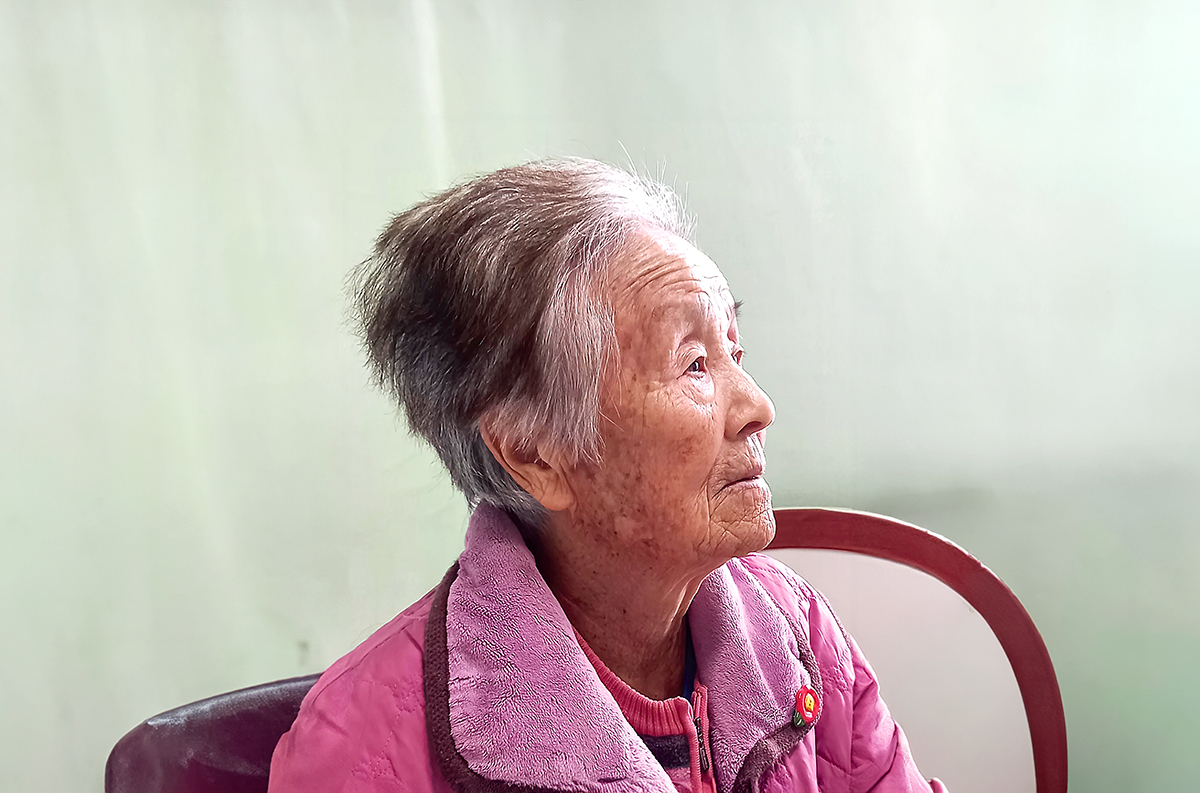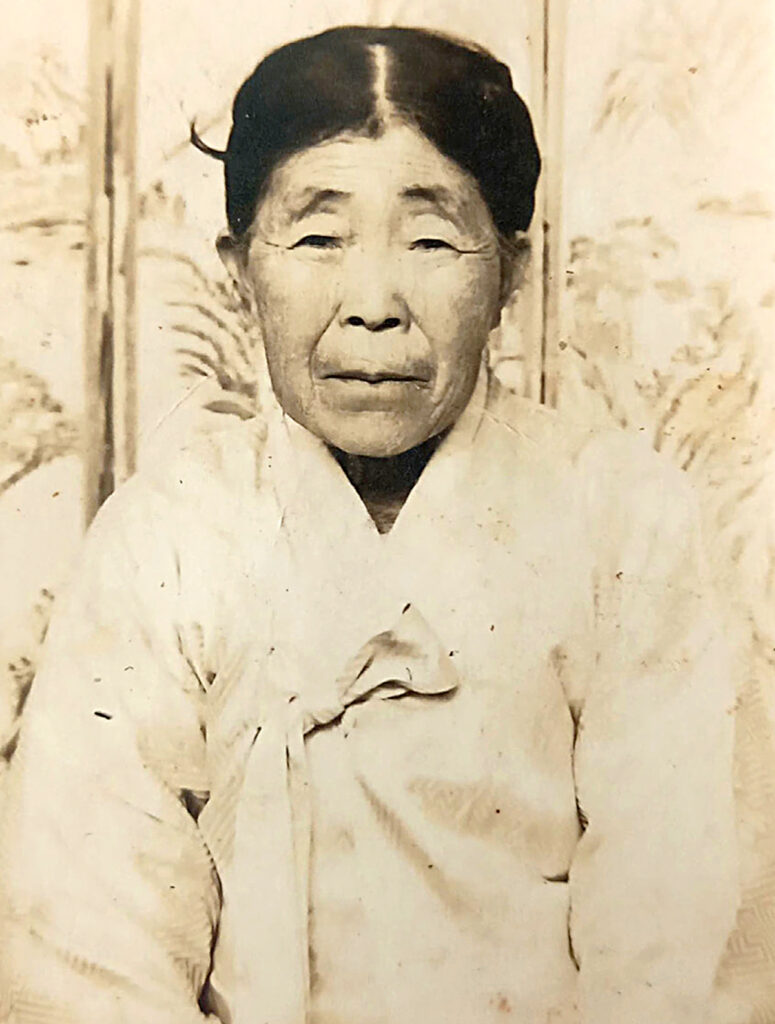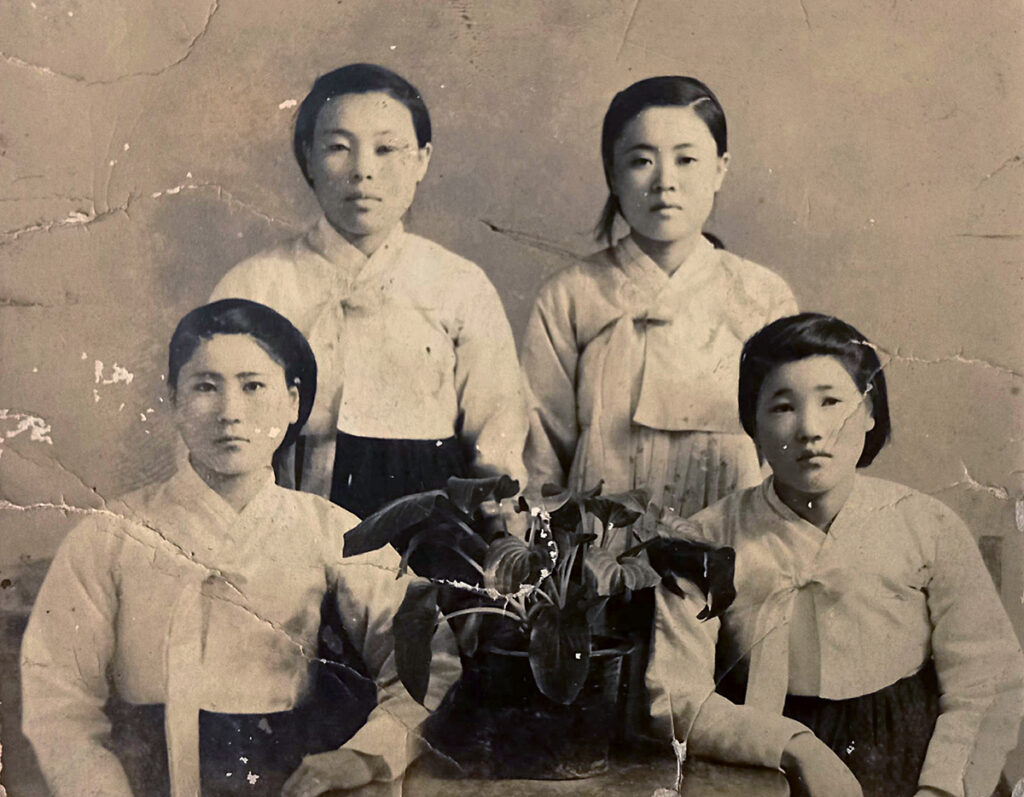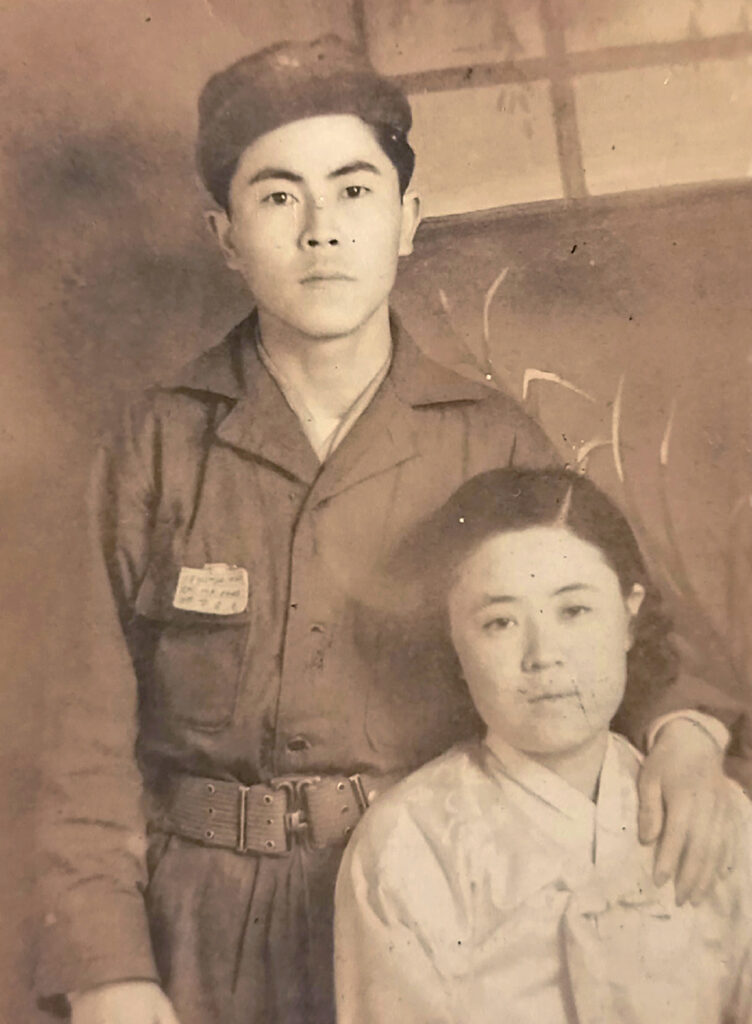Why, how could I slap an old man in his face!

Jeju 4·3 Testimony — Hong Soon-gong (born 1932, lives in Haengwon, Gujwa)
“It was the most dangerous time!” Seventeen is supposed to be the “prettiest age” for girls, but Hong Soon-gong recalls it as the “most dangerous time” of her life. “What was dangerous?” I couldn’t help but ask this silly question.
The elderly lady, who stopped speaking, turned her eye to the sky seen out of the window.
She moved to Sehwa and to Busan, just to live, and was pushed to be married and travel to other regions for the diving work, also just to live. At every crisis in her life, she was faced with the horrendous fear of death and an infernal poverty trap.
How could a woman’s life be this miserable? I interviewed the lady who says that the best thing she did in her life would be giving birth to and raising six children, but she wishes that she could be reborn as a man, if given a chance.
she would like to be born as a man.
Interviewed and photographed by Cho Jung-hee
General Affairs Team, Jeju 4·3 Peace Foundation
The fourth-eldest daughter with many sisters
I’m 92 years old. Although my resident registration says that I’m a year younger, I turn 92 this year. I was born in 1932, but according to my family relations register, I was born in 1933. I was born and raised in Haengwon. I married a man from my town and we became parents. All my children are now married, and now my children became grandparents themselves. So, I did everything I was supposed to do. All I have left to do is meet my parents.
When my father was 19, he had both his knees seriously injured in an accident where a stone wall collapsed over his legs. Unable to walk, he had to sit on the floor and move only with his butt by pushing himself up from the ground with his arms. He was 19, even before he got married. Still, women wished to marry him even if he never went out. I heard he was very handsome and well-educated. After getting married, he had two daughters, but his wife died early from an illness. He then remarried my mother, and my parents had four more daughters. I was the second-eldest to my mother and the fourth-oldest to my father.

Hong Soon-gong’s mother
Three bushels of barley and millet, my father’s payment
Even before schools were built, my father had taught at a village school where kids learned how to read and write. My neighbors called him a “sitting teacher.” They called him so because he had to be sitting on the floor while teaching. My house had a spacious main hall, which was always full of students who came to learn how to read a write. These students came not only from Haengwon but also from Handong, and from Woljeong. There were so many children, all boys.
For teaching all year round, they carried to my house a wooden basket containing three bushels of barley grain in summer and three bushels of white millet grain in autumn. That was my father’s payment for teaching students. He never went out but taught at home, but earned more crops than those farmers working in the field. You know, people used to raise horses and cattle at every household. Some students’ parents brought their own oxen to plow our fields and even thinned out weeds. So, my mother could do farming so easily, often sitting at home.
My father couldn’t walk but there was nothing else he could wish for but just one: a son. Having had no son, he died without passing on all his knowledge to anyone. When I was 14, he tried to teach me with his boy students. I should have listened to him! What if I had inherited even a third of his knowledge? I’ve felt sad and regretful about it throughout my life.

Hong and her friends commemorate their travel to Busan for the diving work.
“My goodness! Why did you come to Jeju?”
My oldest sister moved to Busan early and worked as a diving woman there. So, I was able to travel to Busan often since I was young, with the excuse of going to see my sister. There used to be three cargo ships sailing between Busan and Haengwon. Then, shortly before Jeju 4·3 broke out, I happened to come back to Jeju. How would I know what was happening? I missed my younger sisters and my mother, so I just got onboard the ship. When I arrived at Haengwon, a constable at Gimnyeong Police Substation came to inspect the ship.
“My goodness! Why did you come to Jeju when things are so dangerous here?”
At night, it was so scary because those who had been hiding in the mountain went down to go from door to door and told everyone to come out and listen to their speeches. They threatened that we would be killed if not coming out, so what else could I do? If you wanted to live, you had to go out. Even after the daybreak, it was still scary. When working in the field and in the sea after having breakfast, I heard police gunshots from my neighborhood paths. Bang! Bang! Bang! It was said that since Haengwon was far from the police substation, the villagers will take the side of the Reds. Reds? What Reds?! We were told that they’d kill us, so we couldn’t but go out, just to survive. Who would dare to disobey a gun and a knife!
“Long live the People’s Republic!” “Let’s not listen to the Reds!”
One day, when I was working with my mother and my elder sister in the field, reaping mille, we suddenly heard gunshots like the sound of popping beans. We were so scared, and how could we keep working? My sister and I tried to hide, sitting as close to the stone wall around the field as we could. But we were caught by the constabulary forces and taken to the Haengwon Public Hall. Inside the public hall, there were so many others who had already been caught, from the elderly to children. The constables lined us up in two rows, and suddenly, one of them put a gun against my shoulder.
“If you don’t do as I tell you, I’ll shoot you to death! Long live the People’s Republic! Say it!”
”Long live the People‘s Republic!”
We just followed along, trembling, rising both our hands up.
“Do it again!”
“Long live the People’s Republic!”
“These aren’t colored ‘red’ yet! Get down on your stomach!”
Trembling once again, I lied on my face. Then they hit my butt with a club mercilessly.
At that time, each constabulary wore a club around his waist. We were all beaten up sobbing, however old or young. When they beat us up to their content, they got us up. Now, we were told to stand facing each other.
“Let’s not listen to the Reds! We must not listen to them!”
Leaving us to keep repeating it out loud, they now ordered us to slap each other in the face. How unlucky! Why would I be paired up with an old man?! If I were not to do what I had been told, it looked like the policemen would shoot me. And if I were to do as I had been told, why, how could I slap an old man in the face? I couldn’t help but make a loud noise and pretend to slap him. But after repeating it, over and over again, my hand felt tense although I didn’t even realize it. Unknowingly, I was already hitting him. My goodness! How could a human do that!
Dec. 3, 1948, stabbed seven times with a steel spear
Around that time, a company of soldiers was stationed at Gujwa Jungang Elementary School. We, young women, desperately hid ourselves every night because we were afraid they’d rape us. Even while I was asleep with my mother in the room, when the door was lit with a flash, I always rushed to hide in a jar in the warehouse. As more and more soldiers lit up the flashlight every night, my mother took me to Sehwa, where her parents lived. I was 17, the most dangerous age.
Was it because Sehwa had a police substation? The village was in the middle of autumn harvest. I guess I stayed at my great-aunt’s house for about a month. One evening, it was after we had harvested all the buckwheat and the rice, piling it up in the main hall, I was lying down with her in a room, almost falling asleep. It suddenly became so bright outside as if it had been at daybreak. At the time, we used to turn on the oil lamp, so there was supposed to be no light at night. I quickly got up and slammed the door open! There were already men from the mountain, standing in the yard with a steel spear in their hand.
“Oh, no, what is this about? What’s happening…!”
Before my great-aunt could even finish talking, I saw their spears burst into her chest! Blood poured out with the sound of “Pop!” and I saw it with my own eyes! Ah! My body still shakes whenever I think about that. I feel so scared! But that’s not the end. When she was rolling on the floor, holding her chest, they poked the spear three more times. I thought, “Ah! I’m going to be killed like that, too!” I was so scared that I put a blanket over me… I was all choked, so I couldn’t even ask for my life. Later, I noticed that I had been stabbed four times on my left leg, twice on my left arm, and once on my left shoulder, seven times in total.
“We killed them all. Let’s go!”
As soon as they left the room, I removed the blanket and jumped up. I didn’t know it hurt even when my arms and legs were bleeding all over. The house was on fire, and it seemed like the fire was going to spread into the room any minute. I had to get out of the room first. I couldn’t leave my dying great-aunt there and come out alone. I put my hands under her armpits from behind her and dragged her out. When finally out to the main hall, I saw a worker in his 40s who had been sleeping in the opposite room lying dead on the floor. It didn’t seem like a big deal that a man was dead! I had to live! I dragged my great-aunt over his body, laying them both in the field over the back door, and looked around.
The house was already burned red, but only the outhouse attached to the pig pen was not in flames. Without thinking twice, I went into the outhouse. After sitting there for a long time, I saw the sun starting to shine. Then I heard people.
“If there is any survivor, please come out!”

Hong, aged 23, spends time with her husband on a leave from his military service.
At the guard post on the freezing winter night, I covered my ears and did rabbit jumps!
The martial law was proclaimed. Now I couldn’t even return to Haengwon. There was no more disinfectant that I had applied at the Police Substation. Even the rice ration of 1 liter that had been distributed every day was cut off. Having no other choice, I relied on the Moon family who lived in front of the police substation. There, I took care of their two-year-old son and did house chores to gain food. I remember that the martial law was lifted around the 20th day of January in the lunar calendar. I was 18 years old.
Coming back to Haengwon, I was now told to join the youth group and take training. The youth group consisted of only girls, and there must have been about 30 people. We were trained in the hill of Namdangbat. We wore black labor pants and a white shirt. I don’t know where it came from but we held a wooden rifle each. “Right, face! Forward! Left, face! Turn around! Prone position!” We were trained just like soldiers.
“What are we going to do after this training?”
“You will be conscripted when the situation becomes dangerous!”
What did he mean by the conscription! There was no man left who could stand guard because so many of them had already been dead. Every night, we girls had to stand guard until the daybreak. When five in one group were on guard at each guard post, the constabulary forces would patrol around. It was when the Northwest Youth League from the Korean mainland served as police officers. When on patrol, they tested us for code approval.
If anyone of the five people failed to answer properly, all five of them were to receive disciplinary punishment. At the guard post on the freezing winter night, I covered my ears and did rabbit jumps! Ah! How did I survive it?
All those years!

Hong stands in front of her house in Haengwon Village, with her mother (center), eldest sister (second to the right), second-eldest sister (far right), and mother’s sister (second to the left). The one on the far left is Hong Soon-gong.
To a man without any inheritance, not even chopsticks, I got married, preparing 23 ancestral rites a year
It didn’t seem to end at all. This is why I got married early. There is a saying, “With a rice pot and a water jar already in the house, how come a man does not survive by inheriting them?” In the past, people used to draw water from a well and kept it in a jar. There was no house without a water jar. They also kept rice in a pot in a warehouse, so there would be no family without a rice pot. If you inherit both the water jar and the rice pot, it means that you have the basics of living. Then, nothing would keep you starving. But I got married to a man without any inheritance, not even chopsticks. My in-laws had no relatives, no money, nothing. When my husband was 2 years old, his mother died. His younger brother died during Jeju 4·3. And I got married to this man who had only one elder sister.
My parents didn’t have a son and my husband was the only son in his family. So, I have performed 23 ancestral rites a year, 11 for my in-laws and 12 for my family. I set up the memorial ritual tables with what I earned from working in the field and in the sea all throughout the year.
First, you grind the wheat from the field. You thresh it together with barley, put it in a basket and wash it clean with water. Then, you dry it completely and grind it in a rice mill machine. The crushed powder is sifted to make ritual rice cake with the remaining powder on the strainer, and the filtered fine powder is baked to make another type of rice cake (oil rice cake). You boil buckwheat powder to make jelly and grill it on a pot lid in summer. In winter, you skewer it and coat it with a mixture of soy sauce and sesame oil, and then grill it over a charcoal fire. This is how you prepare memorial ritual tables.
I also caught the fish for the memorial rituals for myself. I shot a rockfish with a small harpoon in the sea. After drying it, I put it in a barley pot, and then grill it over a charcoal fire. If you put a dried rockfish in a barley pot, the fish won’t go bad. In the past, rockfish was considered the best food. And when with a ritual day ahead, I used to dive into the sea about a week in advance and caught a fish. When a fresh fish was ready, I put water in a pot and boil it. I didn’t even add any sauce but just put only the fish in it and then cover it with the lid. When it boils, I turned the heat off and left it cool down. On the next day, I put the pot on fire again. It should be boiled without removing the lid.
If you boil it once a day with wood for a week and then make a fish soup with it, it tastes as good as if you made the soup with a fish you had caught on the previous day. We didn’t have a refrigerator at the time, so I boiled a fish soup like that. I haven’t bought food for those 23 ancestral rites a year. So, how could I have time to rest or sleep in? I did housework when it rained and worked in the field or in the sea when it was sunny. That’s how I have lived.
I tied my baby’s back with a long string to my belly for the diving work
I worked as a haenyeo until I was 84 years old. These days, they grow abalone in the aquafarm, but there was no such thing as aquaculture in the old days. Catching abalone alive was the biggest source of income. When I dived, I used to catch more abalone than others. I was lucky. Since I was so good at catching fresh abalone, my nickname was the “youngest daughter of the Sea Dragon Goddess.”
When my second son was three years old, I had no one to babysit him, so I took him to Namhae for the diving work. I was introduced to a jobless girl in the neighborhood, so I decided to pay her 150 won for babysitting and went to work in the water. It was early July, so imagine how hot it was. Coming back from the sea, I heard a baby crying. The baby didn’t cry on and off, but kept crying so desperately until I became worried about. I thought to myself, “This is weird!” and followed the crying sound. And I saw a baby crying on someone’s dusty field that had been left unattended without farming. “Who would be this crying baby?” I thought. When I got closer, and oh, my! It was my son!
I took them home and undressed him. Then I realized that he was all blisters over his back, arms, and legs. How could a baby live when left in the field under the scorching summer sun? He cried so badly that his face was stained with dirt. I cried a lot, holding him in my arms. I cried for my poor son, and for myself. I cried a lot.
If my boy had been left to die and I had earned a fortune, what would the money have been for? I searched for a ship leaving for Jeju right away and packed. The sailor and the manager were in a big trouble. Back then, Chuseok in August in the lunar calendar was considered a high season. They begged me to leave after working for that peak season. Now, I couldn’t go back to Jeju and there was no one to take care of my baby. I had no choice but to get onboard with my son to continue with the diving work. And the three-year-old boy would never stay still on a boat.
Walking around, he made a fuss about getting into the water with me when I was to dive. In the end, I tied my baby’s back with a long string to my belly. It was meant to keep him from falling into the water when I was in the water or if the sailor or the manager was not looking. Why! It was such a difficult job to handle. I can’t even think about taking my baby ever to my diving work again. I wouldn’t dare!

Hong takes a family photo with her eldest daughter, second-eldest daughter, and second-eldest son.
If I had a chance, I wish I could be reborn as a man!
I gave birth to seven children, but I buried one son in my heart. Now I have six children, three sons and three daughters. There was nothing I couldn’t do and there was nowhere I couldn’t go if it was worth the money to feed and educate them. I did the farm work in the field, dived in the sea, and worked in factories. I raised cattle and became paid a worker in tangerine orchards and potato fields. I was tired when thinking about my children. I worked so hard day and night that my body feels sick everywhere now. But the best thing I did in my life was having my babies.
Does any of my babies worry about children? Do they ever worry about money? Did anyone die from an illness ahead of me? I am grateful that all of my sons and daughters have no big issues in making a living so that they don’t have to ask for help. Without them, how would I know this happiness? Still, if I had a chance, I wish I could be reborn as a man. It feels like I was born as a woman to be punished for having committed a crime in my previous life. My life as a woman couldn’t be this hard unless I had been a person of guilt in my previous life. No matter how precious my babies are, I wish I could be reborn as a man, if given a chance, and do everything a man would do.

Hong sits with her husband near the sea off Haengwon Village where she has worked as a haenyeo all her life.